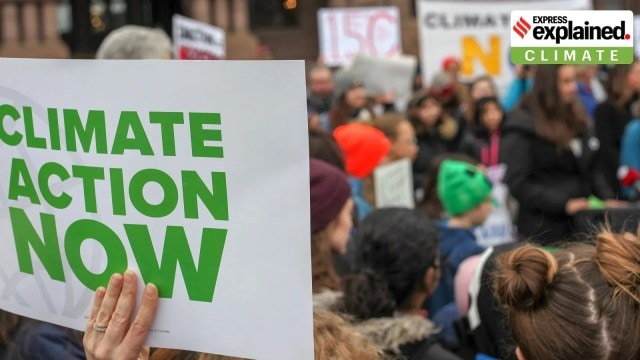Nine years after being finalised, why the Paris Agreement looks more fragile than ever
The main goal of the Paris Agreement — holding global annual average temperatures within 1.5 degree Celsius of pre-industrial averages, two degrees Celsius in the worst case scenario — seems more distant than ever.
 With Donald Trump returning to power next year, the United States is almost certain to exit the Paris Agreement once again.
With Donald Trump returning to power next year, the United States is almost certain to exit the Paris Agreement once again.The Paris Agreement was supposed to save the world from the worst impacts of climate change. But nine years after it was finalised — on December 12, 2015 — it is perhaps more fragile than ever, appearing increasingly ineffective and helpless in containing the rapidly worsening climate situation.
In these nine years, annual global emissions have grown 8% from about 49 billion tonnes of CO2 equivalent to 53 billion tonnes. Average annual global temperatures have increased from 1.1 degree Celsius above the pre-industrial average to 1.45 degree Celsius above that level. And, latest assessments suggest that 2024 is almost certain to be the first year to breach the 1.5 degree Celsius threshold.
The main goal of the Paris Agreement — holding global annual average temperatures within 1.5 degree Celsius of pre-industrial averages, two degrees Celsius in the worst case scenario — seems more distant than ever. In a clear sign of growing frustration with the treaty, a number of developing countries, led by the small island nations, have begun exploring alternative approaches for a more effective fight against climate change. The International Court of Justice is currently hearing a case which seeks to define countries’ obligations on climate change, and the consequences arising out of those obligations.
Changing course
Before the Paris Agreement, came the Kyoto Protocol in 1997. In keeping with the principles of equity and differentiated responsibilities enshrined in the 1992 UN Framework Convention on Climate Change (UNFCCC), the Kyoto Protocol placed the bulk of the obligations of fighting climate change on rich and developed countries, while asking developing nations to contribute according to their respective capabilities.
But unnerved with the rising economic power of China, and afraid of the constraints that climate obligations put on their own economies, developed countries worked hard to dismantle the Kyoto Protocol. Although their first attempt, made in 2009 at the Copenhagen conference, failed, developed countries managed to have their way six years later in Paris.
In the garb of getting everyone to contribute, the Paris Agreement severely weakened the fight against climate change. The Kyoto Protocol had assigned specific emissions reduction targets on developed countries, but placed virtually no responsibilities on the rest of the world. The Paris Agreement mandated everyone to take climate actions, but only in a “nationally-determined” manner, essentially freeing developed countries of their assigned responsibilities.
With every country only putting in a bare minimum effort to meet their Paris commitments, global climate action is now no longer aligned with the emission reductions required to keep global warming in check.
Progressive weakening
But even the provisions contained in the Paris Agreement have been slowly deconstructed over the years to suit the interests of the developed world.
Nothing illustrates this better than the finance deal reached in Baku this year. Developed nations, under the legal obligation of UNFCCC, are supposed to provide finance and technology to developing countries to help fight climate change. Developed nations had themselves promised to raise $100 billion annually for this purpose from 2020. The Paris Agreement has a provision for increasing this amount post 2025.
Several assessments have shown that developing countries need trillions of dollars a year for climate action. However, in Baku, developed countries agreed to raise the $100 billion amount to just $300 billion a year, and that too only from 2035. The lack of adequate finance almost crushes any hopes of more ambitious climate action from developing countries.
Dwindling trust
With Donald Trump returning to power next year, the United States is almost certain to exit the Paris Agreement once again. In general, the trust in the Paris Agreement is dwindling, particularly amongst the countries that are most threatened by climate impacts.
This is why Vanuatu, a small island nation north-east of Australia, galvanised similarly-placed nations to get a resolution passed by the UN General Assembly last year seeking advice from the ICJ on what countries’ climate obligations were.
The ICJ was asked to make its assessment not just on the existing climate-specific legal arrangements represented by the UNFCCC, and its two treaties, Kyoto Protocol and Paris Agreement, but also in light of other international laws like the universal declaration on human rights.
- 01
- 02
- 03
- 04
- 05






































